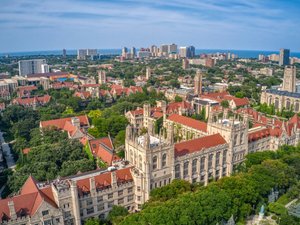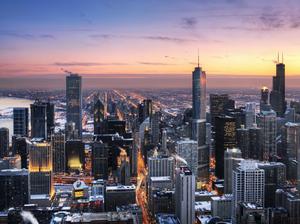Whenever someone talks about Chicago's "brain drain" or tech talent leaving the Midwest for Silicon Valley, Steve Chen inevitably comes up.
Chen, who co-founded YouTube in 2005 after graduating from the University of Illinois, is often lumped in with the likes of Marc Andreessen (Netscape), Larry Ellison (Oracle) and Max Levchin (PayPal) as examples of Illinois' inability to hang on to founders who eventually create massive, industry-changing technology companies.
Whether or not Chicago does enough to retain in-state tech talent is another story. But for Chen, he sees a value in giving back to his Midwestern tech roots. And it's a move that might just keep the next unicorn startup from fleeing.
In 2013 Chen announced he would give $1 million to his high school alma mater the Illinois Mathematics and Science Academy (IMSA) to build an on-campus innovation hub, and last week Chen was in Aurora for the official grand opening. He recently chatted with Chicago Inno about the significance of the new space, his experience at IMSA, and his impression of Chicago's tech scene today.
"IMSA meant a lot to me when I was growing up, especially from an introduction to technology, to programming, and to the internet in general," Chen said.
The new building, called IN2, is a 6,400 square foot space that's modern, open and optimized for collaboration. The space, which cost $1.9 million in total to build, houses 3D workstations, a touch screen video wall, and 3D scanners and printers.

Chen said he wanted the space to resemble the openness of Silicon Valley offices like Google and Facebook, where lounges and meeting spaces help promote free thinking and problem solving. The idea was to create an "environment that's open for innovation and open for entrepreneurs to reside in and build their startups," Chen said, adding that it's important for students to develop programming skills and an entrepreneurial mindset early on in their education. "The earlier the age, the better."
Chen attended IMSA (class of '96) at an interesting time in the evolution of technology. The internet was just going mainstream, and the school's ethernet-connected computers were Chen's first endeavors with the World Wide Web, a foundation he'd later use to build the most popular video-sharing site on the internet.
After graduating from U of I, Chen headed to Silicon Valley, where after quick stints at both PayPal and Facebook, he launched YouTube with Chad Hurley and Jawed Karim. The startup was bought by Google in 2006, a year after it launched, for $1.65 billion.
Since then, Chen has gone on to found Nom, a live video startup centered around food and cooking, which raised a $4.7 million Series A. Chen said he occasionally makes it back to the Chicago area, but admits he isn't too plugged in to the city's tech community.
He said Chicago, and other new tech cities across the US, lack the type of environment that has allowed companies to thrive in Silicon Valley, a town that embraces failure, is more open to innovation, and has a more risk-adverse VC culture, Chen said.
But Chen acknowledged that that's changing, and places like 1871 are helping Chicago grow as a tech ecosystem.
"In the last 15 years there has been this introspection with Chicago [about] what is magical about Silicon Valley that enables these entrepreneurs and engineers to create companies, and why are they not created here within Chicago," Chen said. "Projects like 1871 are a good demonstration that it is possible to do it within Chicago as well. It doesn't have to be in the Bay Area."
Another disadvantage for non-Silicon Valley cities is the lack of a "Sand Hill Road"-type place where where entrepreneurs and collide with investors, even by accident.
"There are a few locations, even a few cafes, where you just have to hang out for a while and you start meeting the top venture capital partners ... in the Bay Area," he said. "It's a little bit harder to find that focused area [in Chicago]."
Now, at least on the campus of IMSA, a space for collaboration and colliding ideas is starting to take shape.
"For something like this to exist at IMSA, I think it's great not just for IMSA but for the entire Chicagoland area," Chen said.








